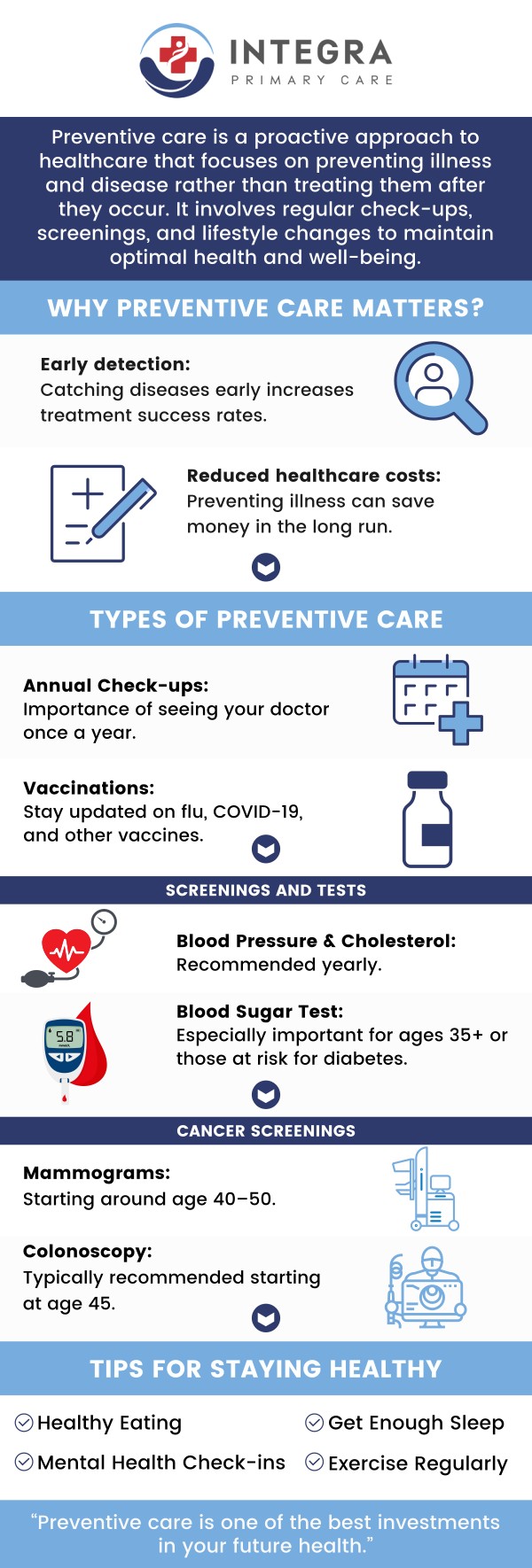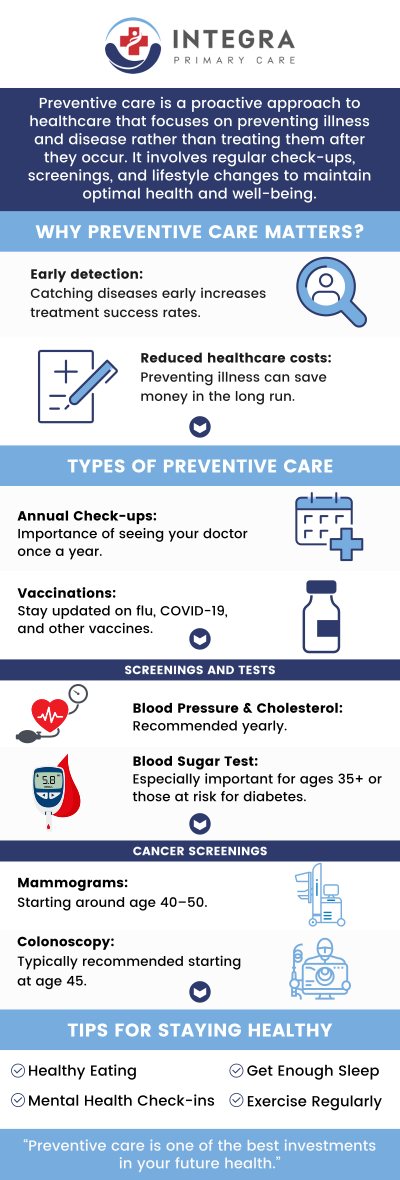Preventive Screening Services in Canton MA
Preventative screenings are a proactive way to monitor your health and detect potential issues early. Integra Primary Care provides a wide range of services, including screenings for common conditions like high blood pressure, diabetes, and various cancers. By identifying risks before they become serious problems, our compassionate team gives you the tools and knowledge to make informed decisions and take control of your health. For more information, contact us or schedule an appointment online. We are conveniently located at 95 Washington St, Ste 204 B, Canton, MA 02021.


Table of Contents:
How do preventive screenings help detect health conditions early?
Do preventive screening guidelines differ for men and women?
What role do blood tests play in preventive health screenings?
Do preventive screenings change if you have a chronic condition?
Preventive screenings are essential for maintaining health and detecting diseases early, often before symptoms appear. These screenings include tests, physical exams, and procedures to identify risk factors or early signs of conditions such as cancer, diabetes, high blood pressure, and high cholesterol.
By catching health issues early, treatment can begin promptly, leading to better outcomes and a reduced risk of complications. Early detection can also prevent the need for more extensive treatments and, in some cases, save lives. Preventive screenings empower individuals to make informed decisions about lifestyle changes or medications to manage health risks before they become serious problems.
Regular screenings are tailored to your age, family history, and personal health needs, helping to protect long-term health and well-being. Taking advantage of these proactive measures is one of the best ways to stay on top of your health and prevent potential future complications.
Preventive health screening guidelines are not one-size-fits-all. Men and women face unique health risks, and our approach is tailored to address these differences, ensuring you receive the most appropriate care based on your individual needs.
For women, we recommend cervical cancer screenings, such as Pap smears or HPV tests, starting in their early 20s or 30s, depending on risk factors. Regular mammograms are also advised for breast cancer detection, typically beginning between ages 40 and 50. These screenings are crucial for early detection and successful treatment.
For men, prostate cancer screening, including prostate-specific antigen (PSA) testing, usually starts around age 50. The decision to begin screening earlier or later depends on personal and family health history, which we assess carefully during visits.
Both men and women benefit from screenings for conditions like colorectal cancer, high blood pressure, cholesterol, diabetes, and osteoporosis. For example, osteoporosis screening is recommended for women at age 65, due to the increased risk after menopause, while men may be screened based on specific risk factors.
We also provide guidance on STI screenings. Annual screening for chlamydia and gonorrhea is recommended for sexually active women under 25, while men may be tested based on individual risk factors. Our personalized approach ensures you receive the best preventive care plan tailored to your unique health profile.
Blood tests play a crucial role in preventive health screenings by providing valuable insights into a person’s overall health and helping to detect potential health issues before they become symptomatic. By analyzing blood samples, healthcare providers can monitor key health markers such as glucose, cholesterol, hemoglobin, white blood cells, and various organ function indicators. These tests can identify conditions like diabetes, high cholesterol, anemia, infections, liver or kidney dysfunction, and even certain cancers at an early stage when they are most treatable.
Additionally, blood tests are essential in assessing the risk for heart disease, as they can detect abnormalities that might lead to serious conditions. Regular blood screenings also help track how well lifestyle changes or medications are working, allowing healthcare providers to make adjustments as necessary. By catching health issues early, blood tests enable timely interventions that can prevent the progression of diseases, improve long-term health outcomes, and ensure that individuals maintain optimal wellness throughout their lives.
Yes, preventive screenings often change if you have a chronic condition. Chronic conditions such as diabetes, hypertension, heart disease, or autoimmune disorders require more frequent monitoring and specific screenings to manage the condition effectively and prevent complications. For individuals with chronic conditions, preventive screenings are customized based on the nature of the condition, personal risk factors, and overall health profile.
For example, people with diabetes need regular screenings for complications such as kidney function, eye health (retinopathy), and nerve damage. Blood glucose levels, kidney function tests, and cholesterol screenings are performed more frequently to monitor disease progression and adjust treatment as needed. Likewise, individuals with high blood pressure require regular checks to assess the effectiveness of their blood pressure management and to monitor the risk of heart disease or stroke.
People with heart disease may require additional screenings, such as cholesterol tests, stress tests, and regular monitoring of heart function. Preventive measures may also include screenings for kidney function and other organ systems that may be affected by cardiovascular issues.
In addition to condition-specific screenings, individuals with chronic health issues may benefit from general preventive screenings, including cancer screenings (such as mammograms or colonoscopies) or osteoporosis tests, depending on age and other risk factors. Regular preventive screenings tailored to specific conditions help catch potential complications early, improve long-term health outcomes, and provide better management of chronic diseases, reducing the risk of serious complications.
Visit Integra Primary Care today to take the first step towards a healthier, more confident future. For more information, contact us or schedule an appointment online. We are conveniently located at 95 Washington St, Ste 204 B, Canton, MA 02021. We serve patients from Sharon MA, Stoughton MA, Norwood MA, Walpole MA, Randolph MA, Mansfield MA, Dedham MA, and surrounding cities.
Check Out Our 5 Star Reviews


Additional Services You May Need

Additional Services
You May Need
• Annual Physicals
• Wellness Exams
• Medical Weight Loss
• Chronic Disease
• Telehealth
• Sick Visits
• Preventive Care
• Mental Health
• Vaccinations
• Direct Primary Care
• Diabetes
• High Blood Pressure
• Cholesterol
• Asthma
• Minor Injuries
• Men’s Health
• Prostate Screening
• Sexual Health
• Primary Care






